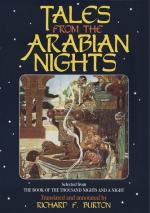[FN#47] In text, “Yasta’amiluna al-Mrd,” which may have a number of meanings, e.g. “work frowardness” (Maradd), or “work the fruit of the tree Arak” (Maradd = wild capparis) and so forth. I have chosen the word mainly because “Murd” rhymes to “Burd.” The people of Al-Yaman are still deep in the Sotadic Zone and practice; this they owe partly to a long colonization of the “’Ajam,” or Persians. See my Terminal Essay, “Pederasty,” p. 178.
[FN#48] “Burd,” plur. of “Burdah” = mantle or woolen plaid of striped stuff: vol. vii. 95. They are still woven in Arabia, but they are mostly white.
[FN#49] So in Tabari (vol. III. 127) Al Hajjaj sees a man of haughty mien (Abd al-Rahman bin Abdullah), and exclaims, “Regarde comme il est orgueilleux: par Dieu, j’aurais envie de lui couper la tete!”
[FN#50] [The phrase is Koranic (viii. 24): “Wa ’lamu anna ’llaha yahulu bayna ’l-mari wa kalbi-hi,” which Rodwell translates: Know that God cometh in between man and his own heart.—St]
[FN#51] “Yathrib,” the classical name ’{Greek}, one of the multifarious titles of what is called in full “Madinat al-Nabi,” City of the Prophet, and vulgarly, Al-Madinah, the City. “Tayyibah,” the good, sweet, or lawful: “Al-Munawwarah” = the enlightened, i.e. by the light of The Faith and the column of (odylic) flame supposed to be based upon the Prophet’s tomb. For more, see my Pilgrimage, ii. 162. I may note how ridiculously the story-teller displays ignorance in Al-Hajjaj, who knew the Moslem’s Holy Land by heart.
[FN#52] In text “Taawil,” = the commentary or explanation of Moslem Holy Writ: “Tanzil” = coming down, revelation of the Koran: “Tahrim” = rendering any action “haram” or unlawful, and “Tahil” = the converse, making word or deed canonically legal. Those are well known theological terms.
[FN#53] The Banu Ghalib, whose eponymous forefather was Ghalib, son of Fihr, the well known ancestor of Mohammed.
[FN#54] In text “Hasab wa Nasab.” It is told of Al-Mu’izz bi Dini’llah, first Fatimate Caliph raised to the throne of Egypt, that he came forward to the elective assembly and drew his sword half way out of the scabbard and exclaimed “Haza Nasabi” (this is my genealogy); and then cast handfuls of gold amongst the crowd, crying, “Haza Hasabi” (such is my title to reign). This is as good as the traditional saying of Napoleon the Great at his first assuming the iron crown—“God gave her to me; woe for whoso toucheth her” (the crown).
[FN#55] [In Ms. “takhs-u,” a curious word of venerable yet green old age, used in the active form with both transitive and intransitive meaning: to drive away (a dog, etc.), and to be driven away. In the Koran (xxiii. 110) we find the imper. “ikhsau” = be ye driven away, an in two other places (ii. 61, vii. 166), the nomen agentis “khasi” = “scouted” occurs, as applied to the apes into which the Sabbath-breaking Jews were transformed. In the popular language of the present day it has become equivalent with “khaba,” to be disappointed, and may here be translated: thou wilt fail ignominiously.—St]




